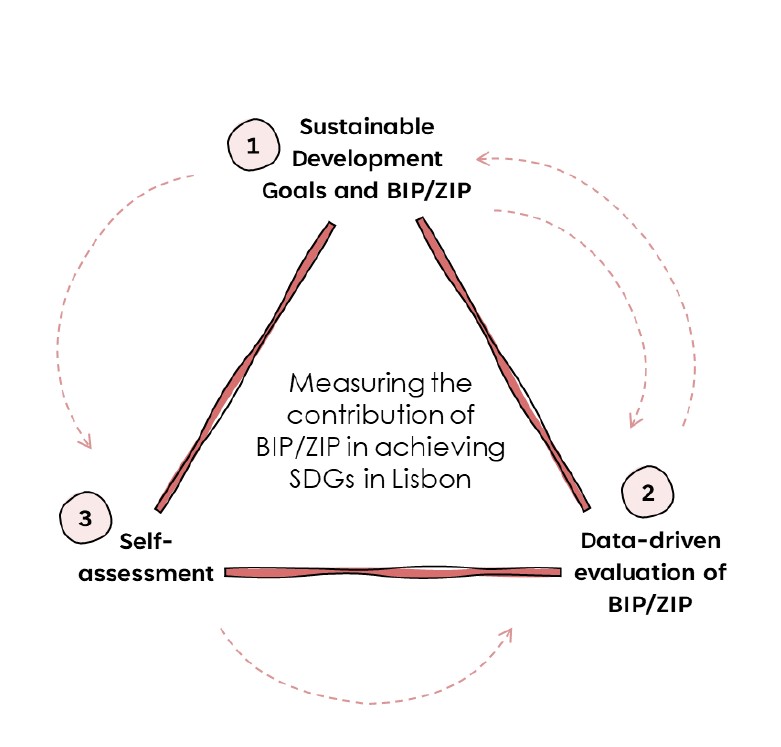Participatory budgets and Sustainable Development Goals
Posted on 29-10-2022
Nowadays, it feels almost impossible to speak about sustainability and not refer to the 17 Sustainable Development Goals (SDGs), developed under the United Nations 2030 Agenda for Sustainable Development. The Agenda brings together economic, environmental and social stands of solutions to holistically address global challenges, based on the principle of “leaving no one behind”. The goals are set out in 169 targets and are formulated within five pillars: people, planet, prosperity, peace and partnership.
Committed to the Agenda, the UN member states adapt their national and local strategies not only for the implementation of measures that contribute to the achievement of the developed goals and targets, but equally significantly for the monitoring of their progress in this direction. In this regard, countries and municipalities develop mechanisms to recontextualise the global targets and report their annual progress.
Placing people as a key pillar for sustainable development denotes that the measures and monitoring should exceed the macroeconomic indicators and look into mechanisms that care for how individuals’ life change for the better. Measuring the effects of such mechanisms at a local level can be a challenging matter, as they entail parameters that are in general consensus difficult to quantify. In this context, in my 4-month secondment at the Department of Housing and Local Development at the Municipality of Lisbon I explored the contribution of the ongoing BIP/ZIP participatory budget in achieving the Sustainable Development Goals in Lisbon.
Participatory Budgets
Participatory budgets are mechanisms for democratising public funds in the sense that they enable the active participation of citizens in the decision-making of how national or municipal resources are spent. Among the main effects of participatory budgeting discussed in the research community are the modernisation of public administrations through transparency and accountability, the efficiency in tackling cross-disciplinary challenges, such as inclusivity and inequalities through the collaborative ways of urban governance they introduce, as well as the reorientation of public expenditures towards least advantaged populations. Doing so, the structures and processes they provide are particularly relevant for the discussion on sustainable development and according to the UN Habitat’s Report (2020) they are considered as accelerators for achieving the SDGs.
BIP/ZIP
Portugal is seen as a paradigmatic case in disseminating participatory budgets issued by municipal agendas (Falanga & Lüchmann, 2019), counting more than 270 active programs in its mainland[1]. The BIP/ZIP Program in Lisbon that I am also researching as a case study beyond the limits of my secondment, was launched in 2011 as the first participatory budget implemented in a European capital city. The project annually funds bottom-up initiatives developed by local partnerships with the objective to promote social and territorial cohesion in priority areas.
During the four months that I was hosted at the Municipality of Lisbon, I was lucky enough to have access to the secondary data of the program and enrich my dataset with qualitative and quantitative information. Looking at the program’s data in correlation to the SDGs, I was able to draw direct and indirect links to specific goals and targets and deliver a preliminary data-driven methodology to measure the impact of the program for the city of Lisbon. Even at this early stage of the methodology, I could safely assume that after ten years of implementation, BIP/ZIP has a significant contribution on achieving the SDGs in Lisbon, so the emerging question is if it is taken into consideration when measuring the city’s progress towards achieving the SDGs.
To make a long answer short, my research showed that the program both at a strategic level and at the micro-scale of each project, is not really accounted in Lisbon’s SDG progress monitoring[2], which indicates that further effort should be made in integrating social indicators into the measuring processes.
Acknowledgements
The end of my secondment was celebrated with a presentation of the results and a very engaging discussion with members of the Department of Housing and Local Development and the BIP/ZIP Division. For this as well as for all the support and hospitality during my stay at the Municipality, I would like to thank Filipa Roseta, Vasco Moreira Rato, Gonçalo Armindo and Isabela Teixeira da Mota, as well as members of the BIP/ZIP Division Maria Antónia Victória, Teresa Tome and Monica Alfredo.
-------
Notes
[1] More information on http://portugalparticipa.pt/Monitoring/?tipo=816f6188-3bac-4dac-92af-3c0892b3018a&keyword=&district=&estado=
[2] For more information on Portugal’s SDG monitoring process with information at municipal level, please visit ODS Local at https://odslocal.pt/
------
References
Falanga, R., & Lüchmann, L. H. H. (2019). Participatory budgets in Brazil and Portugal: comparing patterns of dissemination. Policy Studies, 41(6), 603–622.
UN-Habitat. (2020). Exploring the Role of Participatory Budgeting in Accelerating the SDGs: A Multidimensional Approach in Escobedo, Mexico.
Publications
Pappa, A., & Paio, A. (2023, October). The role of commons-oriented policies in the transformation of urban governance: The case of the participatory budget BIP/ZIP in Lisbon [Poster Presentation]. In 2nd Conference on Participatory Design. Transforming the City: Public Space & Environment, Inequalities & Democracy. Athens, Greece.
Posted on 29-12-2025
Conference
Read more ->


